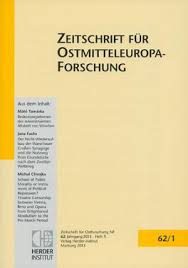Medien als Katalysatoren der Wende? Die DDR, Polen und der Westen 1989
The media as a catalyst of revolt? The GDR, Poland and the West in 1989
Author(s): Franz BöschSubject(s): Media studies, Political history, Social history, Post-War period (1950 - 1989)
Published by: Verlag Herder-Institut
Keywords: Media as a catalyst of revolt; GDR; Poland; West; 1989;
Summary/Abstract: The media have played a key role in many of the revolutions and upheavals of recent times. Taking Poland and the GDR as examples, this article discusses how far this is also true of the collapse of Communism in East Central Europe. Strong media influence is identified in both countries, which, however, differed in its form. Initially in Poland it was the underground media which helped to strengthen the work of the opposition in the 1980s and to professionalise it to such an extent that it was able to expend rapidly in 1988/89 and contribute to overturning the old regime. The limited concessions made by the Communists towards press freedom in 1989 only added a fresh impetus to the collapse, and was especially to be seen in the Gazeta Wyborcza. Many of the protest actions in Poland were deliberately aimed at maximum media exposure. This made possible a limited form of communication with the ruling elite. At the same time the opposition was able to build up the pressure through Western media, both in Poland and in world public opinion. In the GDR, however, it was West German television, by presenting a picture of an alternative form of society, which played the leading role in bringing about the collapse. The montage of diverse protest groups had a cumulative effect and conveyed at an early stage the idea of a broadly-based unified resistance movement, which in turn encouraged others to take part in it. The presence of the cameras provided protection against use of force by the police, on the lines of a “Chinese solution.” It was only in the very last few weeks before the fall of the Wall that the GDR media with a certain limited criticism and openness themselves contributed to the overthrow of the regime. In spite of all differences, the similarities in the influence of the media become apparent. Thus, in both countries the restrictions the press freedom spurred the protests, while foreign broadcasters and foreign entertainment will have raised expectations of the consumer society and a freer way of life. In addition the presence in both countries of foreign journalists may well have influenced the actions of the Communist party leadership which, in fear of being morally discredited in the eyes of world public opinion, was reluctantly willing to make concessions.
Journal: Zeitschrift für Ostmitteleuropa-Forschung
- Issue Year: 59/2010
- Issue No: 4
- Page Range: 459-471
- Page Count: 13
- Language: German

